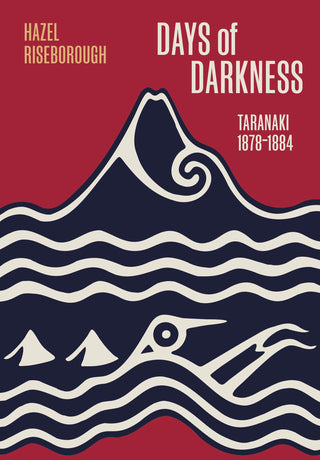Days of Darkness: Taranaki 1878-1884
- Unit price
- / per
-
Author:RISEBOROUGH Hazel
-
ISBN:9781991033666
-
Publication Date:November 2023
-
Edition:1
-
Pages:300
-
Binding:Paperback
-
Publisher:Bridget Williams Books
-
Country of Publication:


A Back Order button means that we don’t have the book in stock at our store. It may already be on order – or we can order it for you from a publisher or distributor at no additional cost.
As we source items from around the globe, a back-order can take anywhere from 5 days to several weeks to arrive, depending on the title.
To check how long this might take, you’re welcome to contact us and we can provide an ETA or any other information you need. We recommend checking the timeframe before committing to an online order.
Days of Darkness: Taranaki 1878-1884
- Unit price
- / per
-
Author:RISEBOROUGH Hazel
-
ISBN:9781991033666
-
Publication Date:November 2023
-
Edition:1
-
Pages:300
-
Binding:Paperback
-
Publisher:Bridget Williams Books
-
Country of Publication:
Description
The narrative of the Parihaka community sheds light on a critical period in Aotearoa's colonial past. As the government seized their land, Maori communities across the region engaged in non-violent resistance, with Parihaka emerging as a powerful symbol of defiance under the leadership of Te Whiti o Rongomai and Tohu Kakahi.
Rather than a history of Parihaka itself, Hazel Riseboroughs compelling account delves into the governments systematic efforts to dismantle Maori rights and self-determination. First published in 1989, Days of Darkness is published now in a new edition which includes opening words contributed by the Parihaka community.
The new edition is a straight re-issue of the 2002 book (long out of print), with new cover, design and images, along with new opening words from people at Parihaka.[
Hazel Riseborough's account is essential reading for anyone who wishes to understand critical aspects of New Zealand's past - Riseborough has presented a study in quintessential colonialism, or the assertion of European supremacy. It is a part of New Zealands history which has to be recognized and not buried. - Judith Binney
Adding product to your cart
You may also like
A Back Order button means that we don’t have the book in stock at our store. It may already be on order – or we can order it for you from a publisher or distributor at no additional cost.
As we source items from around the globe, a back-order can take anywhere from 5 days to several weeks to arrive, depending on the title.
To check how long this might take, you’re welcome to contact us and we can provide an ETA or any other information you need. We recommend checking the timeframe before committing to an online order.
You may also like
You may also like
-
The narrative of the Parihaka community sheds light on a critical period in Aotearoa's colonial past. As the government seized their land, Maori communities across the region engaged in non-violent resistance, with Parihaka emerging as a powerful symbol of defiance under the leadership of Te Whiti o Rongomai and Tohu Kakahi.
Rather than a history of Parihaka itself, Hazel Riseboroughs compelling account delves into the governments systematic efforts to dismantle Maori rights and self-determination. First published in 1989, Days of Darkness is published now in a new edition which includes opening words contributed by the Parihaka community.
The new edition is a straight re-issue of the 2002 book (long out of print), with new cover, design and images, along with new opening words from people at Parihaka.[
Hazel Riseborough's account is essential reading for anyone who wishes to understand critical aspects of New Zealand's past - Riseborough has presented a study in quintessential colonialism, or the assertion of European supremacy. It is a part of New Zealands history which has to be recognized and not buried. - Judith Binney
-
-
Author: RISEBOROUGH HazelISBN: 9781991033666Publication Date: November 2023Edition: 1Pages: 300Binding: PaperbackPublisher: Bridget Williams BooksCountry of Publication:
The narrative of the Parihaka community sheds light on a critical period in Aotearoa's colonial past. As the government seized their land, Maori communities across the region engaged in non-violent resistance, with Parihaka emerging as a powerful symbol of defiance under the leadership of Te Whiti o Rongomai and Tohu Kakahi.
Rather than a history of Parihaka itself, Hazel Riseboroughs compelling account delves into the governments systematic efforts to dismantle Maori rights and self-determination. First published in 1989, Days of Darkness is published now in a new edition which includes opening words contributed by the Parihaka community.
The new edition is a straight re-issue of the 2002 book (long out of print), with new cover, design and images, along with new opening words from people at Parihaka.[
Hazel Riseborough's account is essential reading for anyone who wishes to understand critical aspects of New Zealand's past - Riseborough has presented a study in quintessential colonialism, or the assertion of European supremacy. It is a part of New Zealands history which has to be recognized and not buried. - Judith Binney
-
Author: RISEBOROUGH HazelISBN: 9781991033666Publication Date: November 2023Edition: 1Pages: 300Binding: PaperbackPublisher: Bridget Williams BooksCountry of Publication:
-




